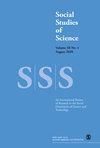精确正义:数据和正义的想象
IF 2.7
2区 社会学
Q1 HISTORY & PHILOSOPHY OF SCIENCE
引用次数: 0
摘要
在赫胥黎(Aldous Huxley) 1932年的小说《美丽新世界》(Brave New World)中,每个人都被技术制约着,以适应他们的社会角色,这是社会所谓稳定和正确的来源。这种“精确正义”的乌托邦在今天的项目中仍然存在,这些项目将数据和算法模型部署到生活的各个分支的决策中,以实现计算创造更公正社会的承诺。我通过分析2019冠状病毒病大流行期间英国使用算法模型计算考试成绩的前景和争议,确定了“精确正义”的社会技术想象。“精确正义”是公正分配的规范概念与识别和风险评估的数据实践相结合的产物,其特点是干预行动、最佳分配和系统管理。它在20世纪70年代美国新兴的“信息社会”背景下具体化,当时对数字形式信息的风险和机会的看法与流行的分配正义理论和实践融合在一起。在这一想象中,关键是人类的模型,它用它来运作和繁殖。分配正义和数据实践的结合并没有将人们引向实质性和宽泛的正义概念,而是将人们与指标捆绑在一起,并将其分配到社会的特定位置。为了超越精确的正义,本文呼吁需要对称地看待正义和数据,作为一组同时存在的认知和规范问题,必须根据我们想要构建的世界一起解决。本文章由计算机程序翻译,如有差异,请以英文原文为准。
Precision justice: An imaginary of data and justice
In Aldous Huxley’s 1932 novel Brave New World every person is conditioned through technologies to fit their social role, which is the source of the society’s alleged stability and rightness. This utopia of ‘precision justice’ is alive today in projects that deploy data and algorithmic models in decision-making in diverse branches of life to realize computing’s promise to create more just societies. I identify the sociotechnical imaginary of ‘precision justice’ by analyzing the promise and contestation of the use of an algorithmic model to calculate exam grades in the United Kingdom during the Covid-19 pandemic. ‘Precision justice’ is the product of the coupling of a normative concept of just distribution with data practices of identification and risk assessment, and is characterized by interventionist action, optimal distribution, and system management. It crystallized in the contexts of the emerging ‘information society’ in the 1970s United States, when visions of the risks and opportunities of information in digital form converged with the popular theory and practices of distributive justice. At stake in this imaginary is the model of the human with which it operates and that it reproduces. Instead of keying people to a substantive and expansive concept of justice, the union of distributive justice and data practices bind people to indicators and allocate them to specific places in society. To move beyond precision justice, this article calls for the need to look at justice and data symmetrically, as a simultaneously epistemic and normative set of concerns that must be addressed together in terms of what worlds we want to build.
求助全文
通过发布文献求助,成功后即可免费获取论文全文。
去求助
来源期刊

Social Studies of Science
管理科学-科学史与科学哲学
CiteScore
5.70
自引率
6.70%
发文量
45
审稿时长
>12 weeks
期刊介绍:
Social Studies of Science is an international peer reviewed journal that encourages submissions of original research on science, technology and medicine. The journal is multidisciplinary, publishing work from a range of fields including: political science, sociology, economics, history, philosophy, psychology social anthropology, legal and educational disciplines. This journal is a member of the Committee on Publication Ethics (COPE)
 求助内容:
求助内容: 应助结果提醒方式:
应助结果提醒方式:


